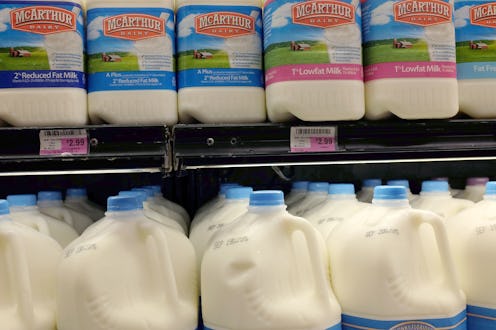News
This Milk News May Be Hard To Digest
For anyone who struggles with lactose intolerance, there might be an answer: Cut down on American milk. To be fair, it's not just American milk — the issue is milk containing the A1 protein, which most often comes from the type of cow preferred by industrial dairy farms in America, as well as some in Europe. The distinction between A1 and an alternative protein, A2, has sparked the possibility of a new kind of milk, one that's friendlier to digestion and health than what we've been drinking stateside.
The debate over the two proteins, and the possible health implications of choosing one over the other, has been prominent across Australia and New Zealand over the last several years, at both the academic and economic level.
Dr. Keith Woodford, a farm management and agribusiness professor at New Zealand's Lincoln University, authored a 2007 book titled (not exactly subtly) Devil In The Milk, examining the relationship between the two proteins and a host of health maladies. Speaking seven years later, he's clearly still in the camp that believes there may be a difference, and one meaningful enough to have major health implications:
We've got a huge amount of observational evidence that a lot of people can digest the A2 but not the A1. More than 100 studies suggest links between the A1 protein and a whole range of health conditions.
Critics have raised doubts about the veracity of the studies, and the correlations they chart — much of the research to-date that furthers this theory is funded by the New Zealand-based A2 Corporation, which produces milk with the alternative protein, and holds a patent on the only genetic test by which to tell the different cows apart.
As such, there's a clear financial motive to convince people that A2 milk is actually a sort of super-milk. Even as studies have demonstrated correlative links between A1 and things like diabetes and heart disease in mice, the history of primarily industry-backed science is fraught with instances of marketing trumping science. As such, these situations deserve scrutiny.
Moreover, in 2004, A2 Corp. was fined $15,000 by the Queensland Health Department in Australia, for "false and misleading" health claims about t the benefits of their milk.
But that notwithstanding, independent studies are beginning to emerge that make this seem like fertile ground for more research. One such example in the European Journal of Nutrition concluded:
The present study thus supports the purported deleterious impacts of consumption of A1 "like" variants of β-casein and suggests possible aggravation of inflammatory response for etiology of various health disorders.
Some one in four Americans suffer from symptoms of lactose intolerance, and if this research ultimately bears fruit, it's possible that some of them could find they're able to enjoy the diary side of life after all — provided that pesky protein is cut out of the picture. And it's a debate headed directly for our shores: A2 Corp. has announced they'll be bringing their milk to the U.S. in coming months.
